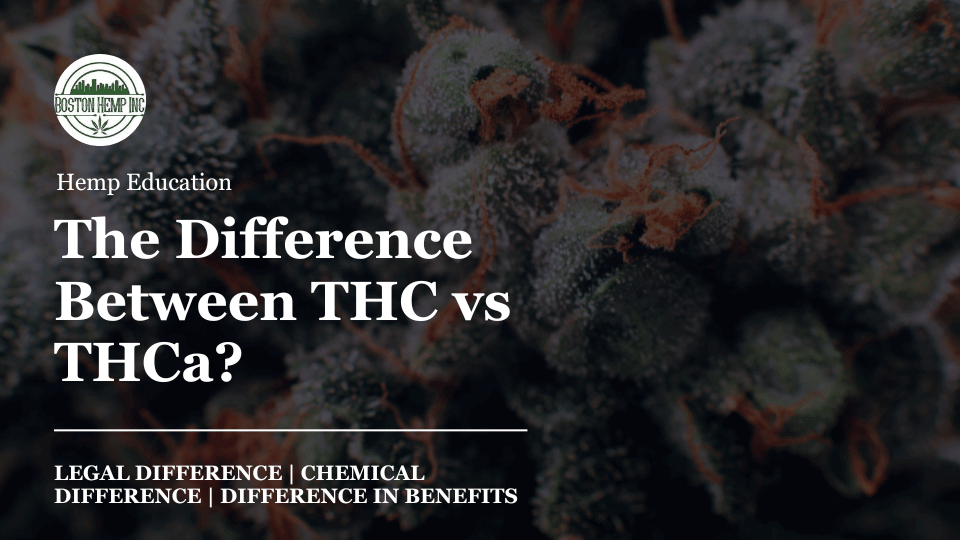In this brief article, we will do our best to share all the basics of THC vs THCa.
To learn more about all the different types of THC check out our extensive article here.
To give you a brief overview of what you can get out of this post, here’s a quick outline of each of the major topics we cover:
- The Difference between THC vs THCa
- The Effects of THC vs THCa
- The Role of THCa in Cannabis
- The Effects of THC vs THCa
- Legal Difference of THC vs THCa
- Other Common Questions About THC vs THCa
What’s the Difference Between THC vs THCa (aka THCA vs Delta 9)?
First of all, THC and Delta 9 are the exact same thing; just two different terms for the same cannabinoid.
THC, or Delta-9-tetrahydrocannabinol, and THCa, or tetrahydrocannabinolic acid, are both compounds found in cannabis, but they have different properties and effects on the body.
THC is the main psychoactive component of cannabis – it’s what gets you “high.”
It has been associated with feelings of euphoria and relaxation but can also cause anxiety in some individuals.
On the other hand, THCa is a non-psychoactive precursor to THC.
This means that THCa doesn’t produce a high until it’s decarboxylated – which is just a fancy word for heated, which we get into in more detail below.
When heat is applied (like when smoking or cooking), THCa converts into THC.
While research on its potential health benefits is still ongoing, preliminary studies suggest that it may have anti-inflammatory and neuroprotective effects.
THC and THCa are both compounds found in cannabis, but they have different properties and effects on the body.
THC is the main psychoactive component of cannabis – it’s what gets you “high”.
It has been associated with feelings of euphoria and relaxation but can also cause anxiety in some individuals or if consumed in large quantities.
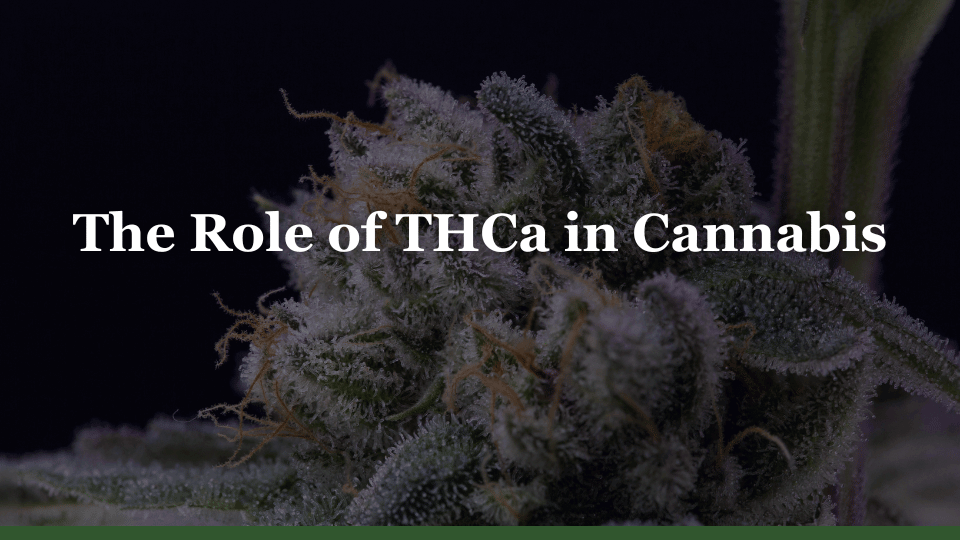
The Role of THCa in Cannabis
How THCa works inside Cannabis
THCa (Tetrahydrocannabinolic acid), is one of the many cannabinoids found in the cannabis plant.
It plays a vital role in the plant’s life cycle and potency.
Initially, THCa doesn’t induce psychoactive effects like its counterpart THC.
In fact, it acts as a defense mechanism for the plant against harmful elements such as pests and diseases.
Additionally, it helps in chlorophyll production which is crucial for photosynthesis – the process by which plants produce food for growth from sunlight.
When exposed to heat or light during processes like drying or combustion (smoking), THCa undergoes decarboxylation and converts into THC, developing its psychoactive properties that cause a “high”.
Cannabis contains several compounds that have different effects on the human body.
Just two of these compounds, THC and THCa, are of particular interest due to their potential therapeutic benefits.
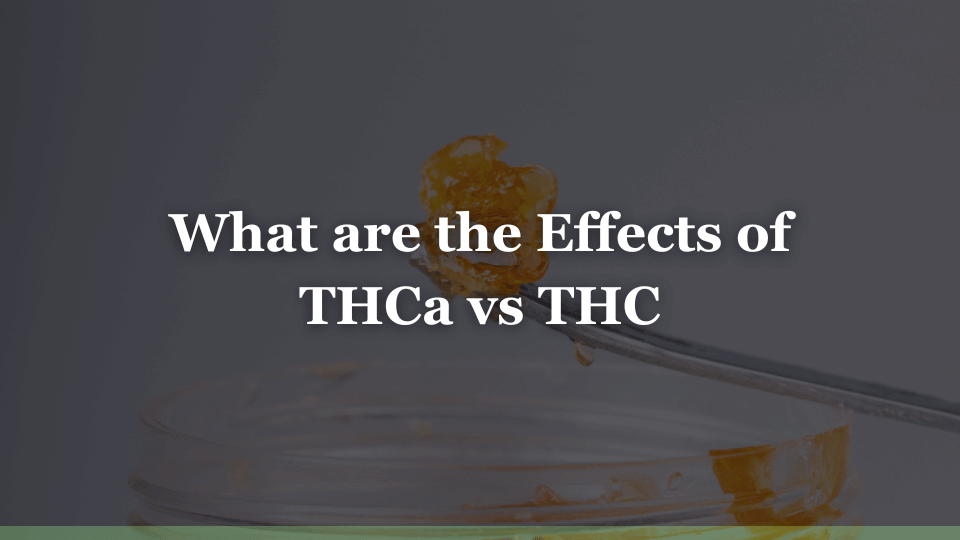
What are the Effects of THCa vs THC
As you know THC is known for its psychoactive effects on the brain, creating a sense of euphoria, relaxation, and altered perception.
This compound is often used for recreational, medicinal, or therapeutic purposes.
On the other hand, THCa is believed to offer various therapeutic benefits without the psychoactive effects. This could make it a potential treatment for conditions such as arthritis and inflammatory bowel disease.
Research suggests that THCa may possess anti-inflammatory, neuroprotective, and antiemetic properties.
Additionally, THCa has been found to have the potential as an analgesic and antispasmodic agent, making it a promising option for those seeking non-psychoactive pain relief.
Additionally, THCa may help manage nausea and vomiting, making it beneficial for cancer patients undergoing chemotherapy.
However, more research is needed to fully understand the effects and therapeutic potential of THCa.
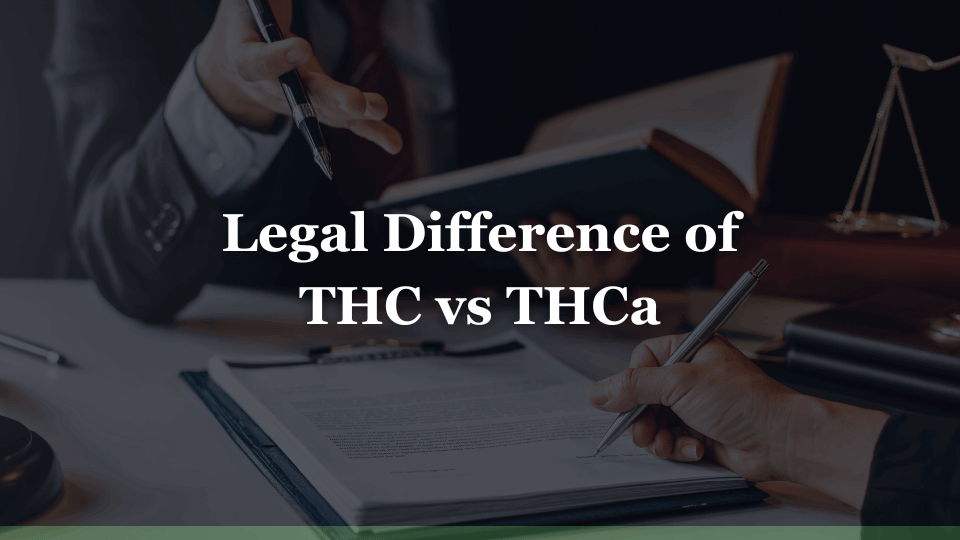
Legal Difference of THC vs THCa
In terms of legality, THC and THCa have different standings.
THC is a controlled substance in many places around the world due to its psychoactive effects.
It is illegal to buy, possess, or consume it without proper authorization such as a medical prescription in some regions.
Meanwhile, THCa is found in raw cannabis and doesn’t produce the “high” associated with THC.
Therefore, it’s treated differently under the law. However, laws vary greatly by region and country so always check local legislation before buying or consuming any form of cannabis.
In some jurisdictions, THCa is not explicitly regulated, allowing for cultivation and consumption.
You could say that THCa is a way to benefit from the effects of THC without directly handling or dealing with it.
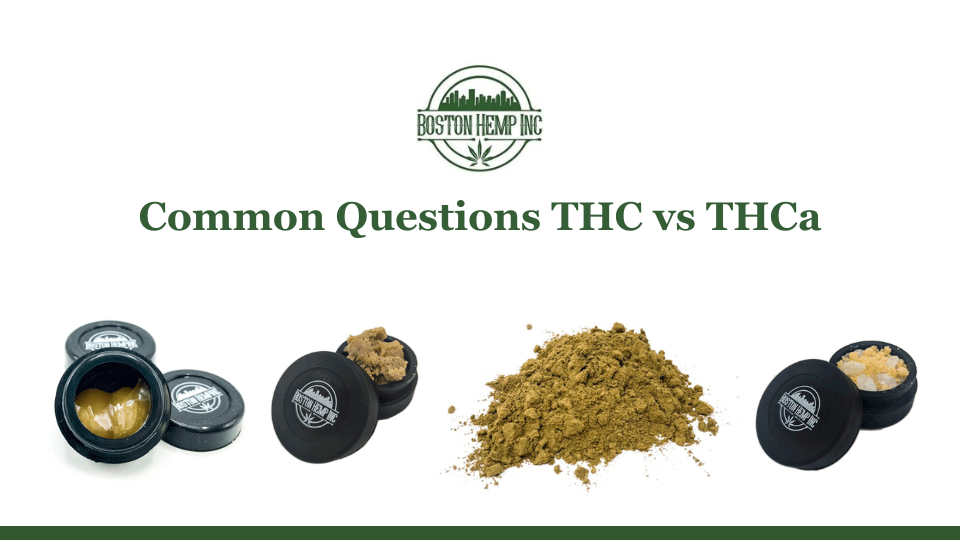
Other Common Questions About THC vs THCa
What is Decarboxylation – from THCa to THC
Definition of Decarboxylation: Decarboxylation is a chemical process that converts the non-intoxicating compound THCa (Tetrahydrocannabinolic acid) into THC (Tetrahydrocannabinol), the psychoactive component of cannabis.
This conversion requires heat and time, typically achieved through methods like baking, smoking, or vaporizing.
Without decarboxylation, consuming raw cannabis would not produce its characteristic effects as THC would be in its inactive form, THCa.
Decarboxylation is necessary for THCa to produce the desired psychoactive effects associated with THC.
There is another method of decarboxylation that doesn’t require heat, and that is through an oil extraction process.
For example, if you take raw cannabis flowers and soak them in an oil such as coconut oil, hemp seed oil, or some other type of edible food-grade oil, and let it sit for an extended period of time.
The resulting oil will have drawn out the cannabinoids and converted them into their decarboxylated state making the psychoactive cannabinoids actually psychoactive.
How THCa works inside Cannabis
THCa, or Tetrahydrocannabinolic acid, is one of the many cannabinoids found in the cannabis plant.
It plays a vital role in the plant’s life cycle and potency. Initially, THCa doesn’t induce psychoactive effects like its counterpart THC. In fact, it acts as a defense mechanism for the plant against harmful elements such as pests and diseases.
Additionally, it helps in chlorophyll production, which is crucial for photosynthesis – the process by which plants produce food for growth from sunlight.
When exposed to heat or light during processes like drying or combustion (smoking), THCa undergoes decarboxylation and converts into THC, developing its psychoactive properties that cause a “high.”
What to buy THC vs THCa
This comes down to what you have access to, what types of products you like to consume and how you like to consume them.
Also, if you’re not wanting to get high but want to experience the benefits of THC, you can consume THCa in it’s raw state and not get the psychoactive effects.
One really great way to get the benefits without the high is to juice the leaves and flowers of a cannabis plant and drink it down fresh.
Or if you are going to smoke, vape, or dab a THCa product like our famous THCa Moonrocks, then you can expect to experience the effects you would get consuming a THC-type product.
One good thing about buying THCa products vs THC is that you can often get better deals and will find the price to be better most of the time.
What’s the Difference of THC vs THCa in Flower
- Natural Conversion Process:
- In a live, growing cannabis plant, the primary cannabinoid is THCa (tetrahydrocannabinolic acid), the acidic precursor to THC.
- Over time, and particularly as the plant matures and is exposed to heat or sunlight, a natural decarboxylation process occurs. This process slowly converts some of the THCa into THC.
- Curing and Drying:
- During the drying and curing process post-harvest, further decarboxylation can occur. This means that the cannabis flower can contain THC even before it’s exposed to heat through smoking or vaping.
- Heat Exposure:
- The most significant conversion of THCa to THC happens when cannabis is heated, as in smoking, vaping, or cooking. This process rapidly decarboxylates THCa into THC.
- Storage and Age:
- Over time, even without intentional heating, some THCa in stored cannabis can convert to THC, especially if the storage conditions involve light, heat, and air exposure. However, this is usually a slow and minimal conversion.
- THC Content Variation:
- Different strains of cannabis have varying levels of THCa, and consequently, the potential THC content also varies. Some strains are specifically cultivated to have high THCa content, which means they can yield high THC levels upon decarboxylation.
THC vs THCa which is healthier?
There isn’t really an objective answer to this as it comes down to your personal situation and the types of effects that you’re looking to get out of your consumption.
In other words, THCa has been known to provide relaxation, anti-inflammatory benefits while THC has been known to help get rid of pain, and reduce anxiety, or even help with nausea.
So it’s not that one is healthier than another, it’s more about what are you trying to get out of your cannabis experience, and do you want to get high or not?
Is THCA as good as THC?
Similar to the previous question and answer, this comes down to personal preference. All of the products we offer here at Boston Hemp Inc are THCa based products, so that would be our preference.
But of course, if you’re looking for a super potent stoner experience you might want to go with a high THC product.
Will you fail a drug test with THCA?
Yes. If you consume THCa, it’s almost guaranteed that you will not pass a drug test. So if you’re looking for the beneficial experience of cannabis but don’t want your drug test to pop off you can check out some of our CBD products here, or we’ve got some helpful information about THC as it relates to being tested here.
Does smoking THCa convert it to THC?
Yes. ? As we described up above, due to the decarboxylation process THCa converts to THC when it’s heated through vaporizing, smoking, dabbing or any other means of heating.
What is DTHC Cannabis?
This is short for decarboxylated cannabis.
So if it’s a product rich in THCa and is not called DTHC that means the THCa is now THC.
THC vs THCa, which is stronger?
So, what is the potency of THC vs THCa? In its raw state, THCa is a less potent cannabinoid compared to THC as it’s not psychoactive.
However, be careful cause as soon as you heat it up, you release the acid compound within the molecule, and now that puppy is going get you lit.
Final Thoughts on THC vs THCa
We hope you enjoyed and got a lot out of this article on THC vs THCa… but if we missed anything, please send us a message and let us know so we can make sure to add it to this post and help get your questions answered.
Boston Hemp Inc.’s team is dedicated to your well-being and health, which is why we continue to produce this content.
We care about you and want to make sure you’re feeling good and are educated about cannabis hemp, so you can have the best experience possible.

